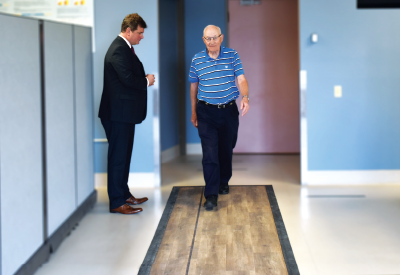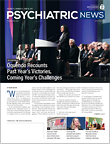Gait disturbances may predict dementia progression in older adults with mild cognitive impairment (MCI). Single-task and dual-task gait testing (walking and performing a challenging cognitive task simultaneously) were used in a recent study to identify participants with MCI at greater risk to develop dementia.
The study, published May 15 in JAMA Neurology, found that low performance in dual-gait testing was significantly linked to a two- to threefold increase risk of dementia, independent of age, sex, education, comorbidities, and baseline cognition.
The research team, led by Manuel M. Montero-Odasso, M.D., Ph.D., director of the Gait and Brain Lab at the Schulich School of Medicine, University of Western Ontario, Canada, used a neuropsychological test battery to assess cognition and recorded gait velocity under single-task and three dual-task conditions. Dual-gait cost was defined as the percentage change between single- and dual-task gait velocities, using an electronic walkway that provided data to assess both spatial and temporal gait parameters. For the dual tests, participants moved at their usual pace on the walkway, while doing the following cognitive tasks aloud: (1) counting backward from 100 by ones, (2) subtracting serial sevens from 100, and (3) naming animals.
The 112 participants who took part in this ongoing prospective cohort study were community-living older adults (mean age 76 years; 55 women) with MCI, a pre-dementia state that carries a 10-fold increased risk of dementia. Data were collected from July 2007 to March 2016, and participants were followed up to six years with biannual visits.
Of the 112 participants in the study, 27 (24 percent) progressed to dementia. Of those 27 participants, 23 progressed to Alzheimer’s disease (85 percent), two to Lewy body dementia (7 percent), one to frontotemporal dementia (4 percent), and one to vascular dementia (4 percent).
The researchers found that those participants who progressed to dementia had a significantly lower dual-task gait velocity result and a higher dual-task gait cost in the three test conditions. High dual-task cost in gait velocity while counting backward and naming animals was associated with dementia progression (incidence rate, 155 per 1,000 person years). Slow single-task gait velocity (less than 0.8 m/second) failed to predict progression to dementia.
“Although we expected that dual-task gait could predict incident dementia, we were surprised by the magnitude of the predictive ability, as it seems higher than cognitive testing,” Montero-Odasso wrote in an email to Psychiatric News. “This may suggest dual-task gait as a test is capturing some subtleties that global cognitive tests may not grasp.”
Generally, about one-third of individuals with MCI remain clinically stable after the initial diagnosis or even revert to normal cognitive functioning making it difficult to accurately predict progression to dementia, including Alzheimer’s disease.
Simple motor tests such as gait velocity and dual-task gait can serve as a screening test for psychiatrists to select which patients may need more invasive or expensive testing, including biological and imaging biomarkers to predict their dementia risk, according to Montero-Odasso.
“Due to the simplicity of the testing, we believe it could be easily incorporated in specialist clinics as part of the comprehensive assessments of older adults with cognitive complaints,” he wrote. Furthermore, the testing is easy to administer, noninvasive, and low cost. Dual task gait velocity can be simply measured using a stopwatch, and dual-task gait cost is easily calculated.
Dual-task gait testing may serve as a kind of “brain stress test” to detect impending cognitive decline in patients with subclinical damage, Montero-Odasso and colleagues wrote. They noted that brain circuits shared by both cognition and motor-gait performance can be impacted by neurogenerative aging.
“Episodic memory, a cognitive domain that was affected in all of our participants who progressed to dementia, relies on frontal-hippocampal circuits that are also central for gait control. In addition, gait control also relies on the prefrontal-striatal networks that are involved in executive function, which was similarly impaired in all of our participants who progressed to dementia,” they wrote.
The Gait and Brain Study is a longitudinal, clinic-based cohort study that started in 2007 to identify motor biomarkers that could predict cognitive decline in older adults. The program continues to enroll participants, currently at 250 older adults, with a goal to recruit a total of 400. The study will continue at least until 2022, based on current funding, according to Montero-Odasso.
The Gait and Brain Study is funded by grants from the Canadian Institutes of Health and Research, the Ontario Ministry of Research and Innovation, the Ontario Neurogenerative Diseases Research Initiative, the Canadian Consortium on Neurodegeneration in Aging, and by the Department of Medicine Program of Experimental Medicine Research Award, University of Western Ontario. ■
An abstract of “Association of Dual-Task Gait With Incident Dementia in Mild Cognitive Impairment: Results From the Gait and Brain Study” can be accessed
here.

